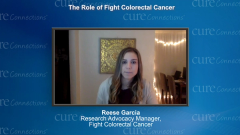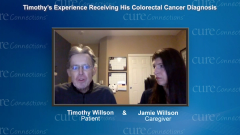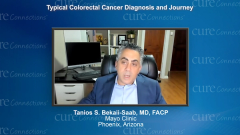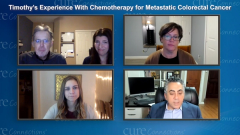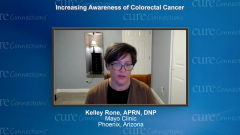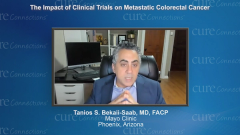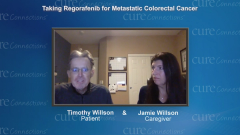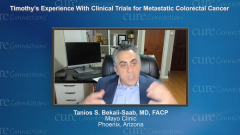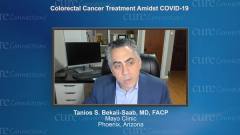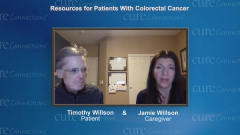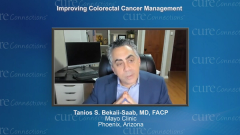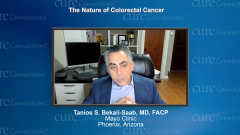
Timothy's Experience With Clinical Trials for Metastatic Colorectal Cancer
Episodes in this series

Tanios S. Bekaii-Saab, MD, FACP: You have been through another couple of trials, correct?
Timothy Willson: Yeah.
Tanios S. Bekaii-Saab, MD, FACP: Was the experience the same or different?
Timothy Willson: They were about the same. The last clinical trial did not affect the feet or the hands as much. I do not know if my body is just adjusting to what is happening there, but it was pretty much the same. Being able to take it at home was a huge difference. We then did one clinical trial with immunotherapy.
Tanios S. Bekaii-Saab, MD, FACP: Immunotherapy, yes.
Timothy Willson: That did not do too much.
Tanios S. Bekaii-Saab, MD, FACP: No, unfortunately not in your type of cancer, the microsatellite stable type. Although the study you are mentioning was with an agent that was trying to inflame the cancer and make immunotherapy more effective, it did not pan out. Jamie, you are pretty knowledgeable about clinical trials, drugs and all that. How do you see yourself helping Tim go through the process of thinking about and enrolling in these trials? Of course, whether you are on trial or not, there are side effects to be managed, and there is sometimes a bit more that is unexpected with clinical trials. How did you handle all this?
Jamie Willson: For me, clinical trials are definitely beneficial and normal. I work for an oncology company. I have been in the oncology industry for over a decade, so I understand the value of clinical trials. Tim is obviously well educated in this space, so I was helping him go through the information to make an intelligent decision, looking at the pros and cons and what would be best for him in his situation. As he mentioned, we both view trials as an opportunity to try something new.
We have always talked with you about those next plans—A, B, and C and what comes next. It is empowering for a patient to know that, even though the standard of care is out there and you may have tried it, there are these new options, and there are better and better options available every day. He is already educated, but I was helping him with that process, understanding the pros and cons and supporting the decision he makes in terms of which trials he feels are appropriate for him.
Tanios S. Bekaii-Saab, MD, FACP: You guys are a team, and you have certainly navigated this with greatness. Reese, I am going to go back to you and ask you this: How does your platform educate patients for enrollment in clinical trials? Obviously, Tim and Jamie have quite a bit of background, but most patients do not have the same background, and they probably want to reach out to you. How do you educate patients about clinical trial enrollment? What are some educational resources you may have for not just patients but also nurses and other health care professionals, especially when thinking about the side-event management?
Reese Garcia: From a high level, we have lots of printed materials, webinars and blogs that focus on these issues: clinical trial myths and enrollment questions. We get at the high level of what patients need to know about entering a clinical trial. The myths component is big, so we have a clinical trial minimagazine, which is our holy grail of clinical trials. It outlines everything a patient needs to know from starting to look for a clinical trial all the way through the end of a clinical trial. Those resources support Fight CRC’s [Colorectal Cancer] Clinical Trial Finder, which is a great resource for not only patients but also—as you mentioned, Dr. Bekaii-Saab—nurses and providers.
Our Clinical Trial Finder is not comprehensive, which is important to know. It pulls clinical trials from clinicaltrials.gov. On the back end, we actually have six patient advocates who are research advocates, sifting through the trials, looking for trials that would benefit patients with stage IV disease with microsatellite stable tumors as we talked about. At the time when it was developed in partnership with a scientist named Dr. Tom Marsilje, who was going through his own stage IV battle with colorectal cancer. He saw the need to pull in patients at the back end, to both Jamie’s and Kelley’s points about having educated empowerment among those facing colorectal cancer. This Clinical Trial Finder is directed toward those who have stage IV disease with microsatellite stable tumors looking for the trial that will be their next option, knowing that the algorithm we use is identifying those with the highest potential benefit and the lowest chance of failure in the eyes of our late scientist Dr. Tom Marsilje.
That tool is good for patients to feel empowered and search for trials themselves, but it is also great for a provider to search for trials while their patient is in the office. We have some great anecdotal stories about patients who brought the trial finder to their provider. They were able to sit in the office together and look at trials that were relevant for them at the time. Those are the main ways we do so, and then we also partner with some other organizations that have different nuanced communities that we can point our patients to as well.
Tanios S. Bekaii-Saab, MD, FACP: That is an amazing enterprise. I know that we have had quite a few patients who have navigated your platform successfully and have been directed to many of the clinical trials. This certainly makes a world of difference, so thank you for what you do.
Transcript Edited for Clarity

